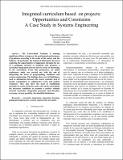| dc.contributor.author | Mora, Sonia | |
| dc.contributor.author | Coto, Mayela | |
| dc.date.accessioned | 2020-10-23T19:49:35Z | |
| dc.date.available | 2020-10-23T19:49:35Z | |
| dc.date.issued | 2013 | |
| dc.identifier.other | 9781479913404/13 | |
| dc.identifier.uri | http://hdl.handle.net/11056/18427 | |
| dc.description.abstract | The Universidad Nacional is making significant efforts to improve the professional performance of graduates according to the needs of the society and the industry. In particular, the School of Informatics has been exploring the opportunities to implement, through the use of a pedagogy oriented to problems and projects, a curricular integration between diverse areas of knowledge in the curriculum. From this perspective, an initial exploratory study was carried out, with the aim of integrating the areas of programming, databases and systems engineering. The findings show several limitations, such as mismatches between the course contents, lack of faculty commitment to collaborative work and student resistance. They also show the need of establishing strategies to create, from the early years of the curriculum, the necessary conditions to promote a positive attitude towards curricular integration processes and therefore overcome, at least partially, the identified limitations. | es_ES |
| dc.description.abstract | La Universidad Nacional está realizando importantes esfuerzos para mejorar el desempeño profesional de los egresados de acuerdo con las necesidades de la sociedad y la industria. En particular, la Facultad de Informática ha estado explorando las oportunidades para implementar, mediante el uso de una pedagogía orientada a problemas y proyectos, una integración curricular entre diversas áreas del conocimiento en el currículo. Desde esta perspectiva, se realizó un estudio exploratorio inicial, con el objetivo de integrar las áreas de programación, bases de datos e ingeniería de sistemas. Los hallazgos muestran varias limitaciones, como desajustes entre los contenidos del curso, falta de compromiso del profesorado con el trabajo colaborativo y resistencia de los estudiantes. También muestran la necesidad de establecer estrategias para crear, desde los primeros años del currículo, las condiciones necesarias para promover una actitud positiva hacia los procesos de integración curricular y así superar, al menos parcialmente, las limitaciones identificadas. | es_ES |
| dc.description.sponsorship | Universidad Nacional, Costa Rica | es_ES |
| dc.language.iso | spa | es_ES |
| dc.publisher | 39th Latin American Computing Conference, CLEI 2013 | es_ES |
| dc.rights | Acceso abierto | es_ES |
| dc.subject | CURRICULAR INTEGRATION | es_ES |
| dc.subject | INTEGRATIVE LEARNING | es_ES |
| dc.subject | PEDAGOGICAL APPROACHES | es_ES |
| dc.subject | SYSTEMS ENGINEERING CURRICULUM | es_ES |
| dc.subject | EVALUACIÓN DEL CURRÍCULO | es_ES |
| dc.subject | APRENDIZAJE | es_ES |
| dc.subject | PEDAGOGÍA | es_ES |
| dc.title | Integrated curriculum based on projects: Opportunities and constraints a case study in systems engineering | es_ES |
| dc.type | http://purl.org/coar/resource_type/c_8544 | es_ES |
| dc.description.procedence | Escuela de Informática | es_ES |

